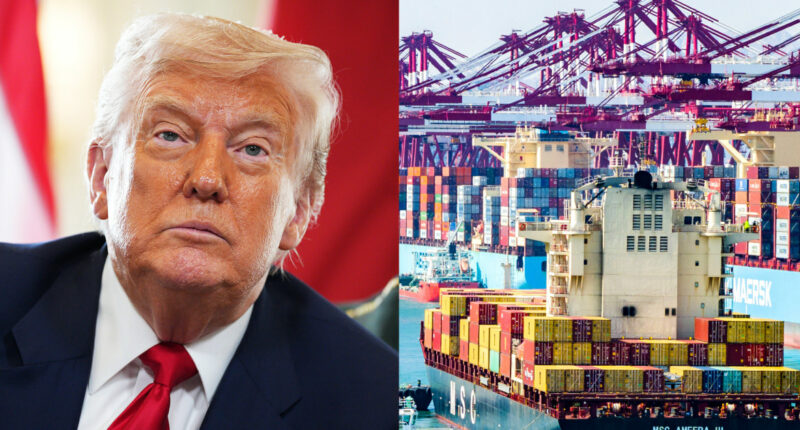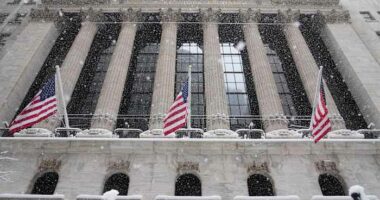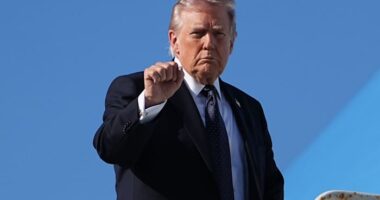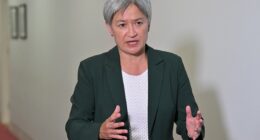Share this @internewscast.com
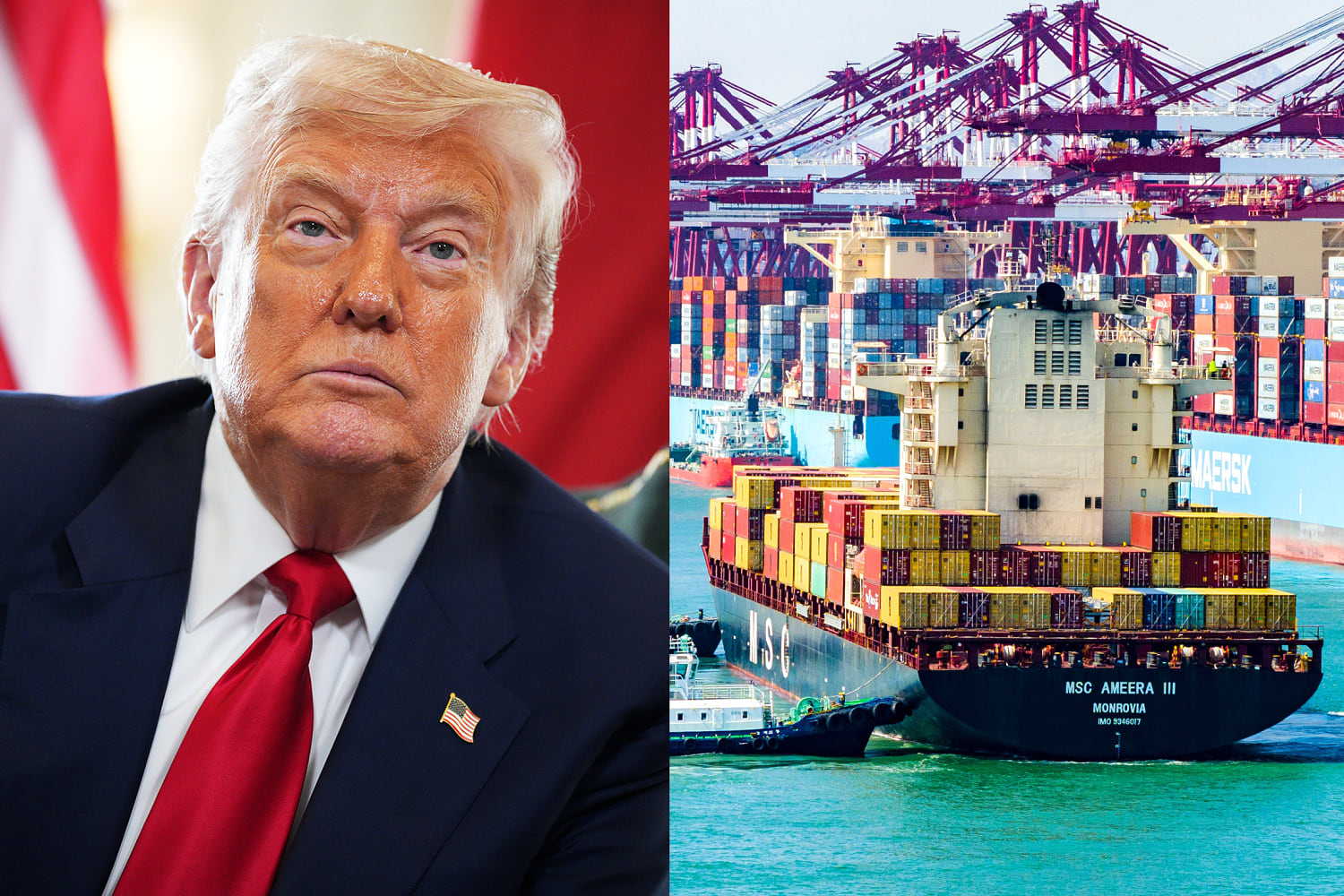
A federal appeals court declared on Friday that President Donald Trump exceeded his authority by using an emergency-powers statute to impose tariffs, stating that this power rests solely with Congress.
However, the judges said the tariffs can stay in place as the case proceeds.
“The fundamental Congressional authority to impose taxes, including tariffs, is exclusively assigned to the legislative branch by the Constitution,” a decision signed by seven judges from the U.S. Court of Appeals for the Federal Circuit noted.
“Tariffs are a core Congressional power,” it said.
This decision impacts two sets of tariffs Trump attempted to enforce. The first involves “reciprocal” tariffs by country, which range from 34% for China to a 10% standard for other countries worldwide. It also pertains to a 25% tariff Trump placed on certain goods from Canada, China, and Mexico, citing these countries’ alleged failure to control fentanyl trafficking.
The ruling from Friday does not concern tariffs applied under different laws, like the 50% tariffs on steel and aluminum imposed on all global trading partners. These tariffs were enacted under different provisions of the Trade Act of 1974 and the Trade Expansion Act of 1962.
In a Truth Social post on Friday evening, Trump pointed out that the tariffs would still be in force, while accusing the court of partisanship saying, “a Highly Partisan Appeals Court incorrectly said that our Tariffs should be removed.”
He further added, “But they know the United States of America will prevail ultimately. If these Tariffs ever disappeared, it would spell disaster for the Country, leading to financial weakness, and we need to be strong.”
“President Trump lawfully exercised the tariff powers granted to him by Congress to defend our national and economic security from foreign threats,” White House spokesman Kush Desai said in a statement. “The President’s tariffs remain in effect, and we look forward to ultimate victory on this matter.”
In a dissenting opinion, the four judges who voted against the ruling, who included Kimberly Moore, the court’s chief judge, argued that the International Emergency Economic Powers Act (IEEPA) had been appropriately used by Trump in relation to the tariffs.
ding to the dissent, Circuit Judge Richard Taranto wrote: “We conclude that IEEPA’s authorization of presidential action in this realm is not an unconstitutional delegation of legislative authority under the Supreme Court’s decisions, which have upheld broad grants of authority, including tariffing authority, in this foreign-affairs-related area.”
The administration is likely to appeal to the U.S. Supreme Court, which is currently composed of six conservative justices and just three liberals. Three of the six conservatives were nominated by Trump.
However, it may also wait until the case is reconsidered by the Court of International Trade, which first took up the case. In its Friday decision, the appeals court said the CIT may have violated a recent Supreme Court ruling limiting judges’ ability to impose so-called universal injunctions that reach beyond the scope of a given case.
Neal Katyal, an attorney for the plaintiffs, said in a statement that Friday’s decision represented “a powerful reaffirmation of our nation’s core constitutional commitments from our nation’s Founders, especially the principle that Presidents must act within the rule of law.”
In a follow-up call with reporters, Katyal called the decision “a win for our Constitution and founders’ vision of what America is.”
“What this decision reflects is a commonsense principle that many of us take to heart: The Constitution is not a partisan doc written for liberals or conservatives. It’s written for all of us,” Katyal said.
Uncertainty due to the tariff policy rollout has roiled stock markets, businesses and consumers alike for the better part of five months. The appeals court’s ruling will likely cause even more.
Many businesses have said tariffs have caused confusion and made it extremely difficult to plan. “Retailers typically plan their inventories six to nine months in advance to meet seasonal demand. However, unpredictable and rapidly changing tariff policies are making it nearly impossible to forecast costs, place orders and manage supply chains effectively,” the National Retail Federation said in June.
V.O.S. Selections Inc., a wine and spirits importer, and Plastic Services and Products, a pipe and fittings company, sued Trump over his use of the International Emergency Economic Powers Act of 1977, saying he has “no authority to issue across-the-board worldwide tariffs without congressional approval.”
The Court of International Trade initially blocked the tariffs in late May. It found that the import duties lacked “any identifiable limits” and that the law Trump cited in many of his executive orders did not “delegate an unbounded tariff authority to the President.” It also said the tariffs did not meet the test of responding to an “unusual and extraordinary” risk to the country.
The tariffs have kicked off a reset of the world’s trade relations, which the president says is designed to benefit the United States.
Trump believes the taxes on imported goods will erase trade deficits and bring back manufacturing to the United States. He has touted at least $125 billion in revenue his already existent import taxes have brought in, with hundreds of billions more pledged by a handful of countries in the form of investments. However, economists say tariffs appear to be slowing economic growth and inflation has started to tick up in recent months.
Even though use of the IEEPA law has been blocked, the administration has a number of other ways to impose import taxes if the Supreme Court also blocks its use.
For example, Trump could instruct the commerce secretary and the U.S. trade representative to launch investigations under Section 301 of the 1974 U.S. Trade Act against various trading partners, which would allow tariffs to be implemented after an investigation runs its course. He could also use Section 232 of the 1962 trade law, which he is already using for steel and aluminum duties.
There is also a never-before-used trade law, Section 338 of the Trade Act of 1930, which allows the president to impose tariffs of up to 50% on imports from countries.
Trump could also negotiate and agree to formal trade deals. So far, though, most of what he and his administration have called deals are not full-fledged pacts. Instead, they are framework agreements light on details and announced on social media followed by slim executive orders.
However, formal trade deals typically take years to reach because of the highly complex nature of the U.S. and global economies. The United States alone has more than 12,000 possible tariff categories among 200 trading partners, according to the financial services firm UBS.
